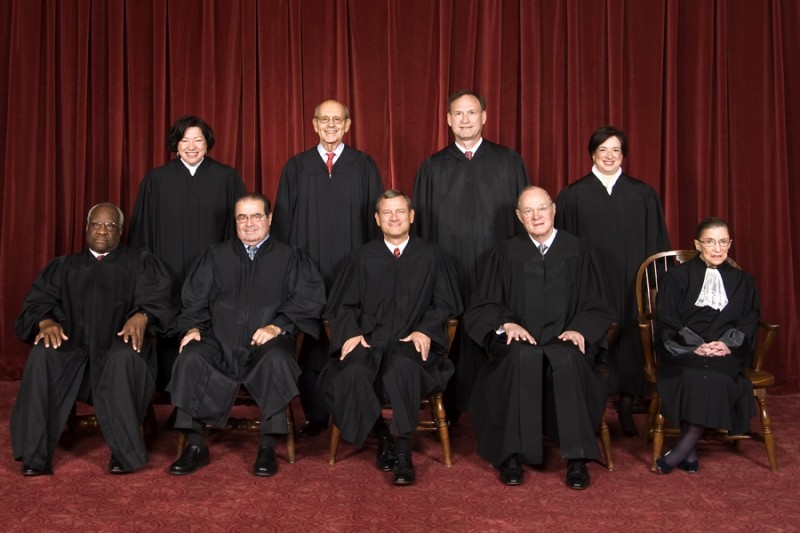Belding: Supreme Court decision is a victory for whom?
As with all Supreme Court decisions, the Obamacare case says nothing about whether passing the law was a good idea.
July 9, 2012
The Supreme Court’s recent decision in the case National Federation of Independent Business v. Sebelius, which pronounced judgment on the Patient Protection and Affordable Care Act, more popularly known as Obamacare, neither vindicates in an “I told you so” fashion the Democrats who voted for the act and lost their seats, nor does it embody a victory for the American people because it upheld policies that ensure health insurance for everyone.
The Court’s ruling proves nobody right.
The real vindication will come when what we were told would ensue from adoption of the health insurance reform law comes true, or that the facts reported in news outlets everywhere — many years from now — bear out the law’s provisions and show that it was a good policy and a sound idea.
As with all Supreme Court decisions, this case says nothing about whether passing the law was a good idea. Chief Justice John G. Roberts Jr. observed in his opinion that the Supreme Court does “not consider whether the Act embodies sound policies. That judgment is entrusted to the Nation’s elected leaders. We ask only whether Congress has the power under the Constitution to enact the challenged provisions.”
He continued the thought a few pages later: “Members of this Court are vested with the authority to interpret the law; we possess neither the expertise nor the prerogative to make policy judgments. Those decisions are entrusted to our Nation’s elected leaders, who can be thrown out of office if the people disagree with them. It is not our job to protect the people from the consequences of their political choices.”
In other words, the Supreme Court says it’s not their job to protect us from our own stupidity.
Roberts’s articulation of such fundamental, basic judicial principles before diving into the law might seem unnecessary or even superfluous, but clearly it was essential: In the days after the Supreme Court announced their decision, editorials in newspapers and comments from politicians appeared that described the decision as a great victory for the American people, or proof the Democrats who favored the Act were right after all.
The reaction to the Court’s decision shows we too often forget the Supreme Court is supposed to be made up of partisans of the law, not political partisans who rule in favor of their own personal beliefs or those of the highest bidder. It is their job to judge the constitutionality of the laws — or so Chief Justice John Marshall wrote in 1803, in Marbury v. Madison, the case that crystallized the principle that the Supreme Court reviews laws to ensure their constitutionality.
His insight has reverberated through the ages: “It is emphatically the province and duty of the judicial department to say what the law is. Those who apply the rule to particular cases, must of necessity expound and interpret that rule. If two laws conflict with each other, the courts must decide on the operation of each. … If, then, the courts are to regard the Constitution, and the Constitution is superior to any ordinary act of the legislature, the Constitution, and not such ordinary act, must govern the case to which they both apply.”
Partisans of no political faction or interest group, Supreme Court justices are partisans of the Constitution. Unlike executive or legislative branch officials, who protect it only by making decisions and acting in accordance with their often flawed interpretations of it, justices actually tell us what the Constitution means with respect to certain laws whose authority is in question.
In giving the Supreme Court, rather than Congress and the presidency who are exposed to political winds, the power to hear “all Cases, in Law and Equity, arising under this Constitution,” the Constitution gives the Supreme Court authority, not just power. While Congress and the presidency only have authority if their actions are constitutional, the Supreme Court’s decisions are inherently constitutional. A durable body charged with defining law and not making or carrying it out, Supreme Court decisions almost come down from on high as if the Olympians of the ancient Greek world were descending from Mount Olympus to grant legitimacy to the kings of the Hellenic city-states.
Unlike monarchies such as the United Kingdom, the United States possesses no one entity that embodies the country. Instead, the Constitution serves that purpose. Thus, we need at least one apolitical branch of government. Just as the Queen of the United Kingdom prefers to keep out of the political jousting matches among Tories, Liberals and Labourites, the Supreme Court remains (on good days) above inherently changeable politics and keeps to its role as the champion of the U.S. Constitution itself. The judiciary grants constitutional legitimacy to the People, who act through their representatives in Congress — but only in accordance with carefully listed powers — and carry out laws through the president and his assistants.
Justice Roberts understood as much and tried to remind us of it (for the nth time) in his opinion. Drawing once again on Justice Marshall, he quoted the latter’s defense of his ruling in another case, M’Culloch v. Maryland, in 1819: “The peculiar circumstances of the moment may render a measure more or less wise, but cannot render it more or less constitutional.”







